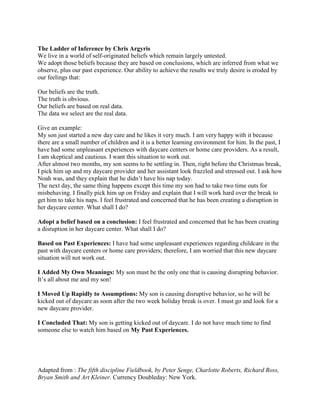
Ladder_of_Inference
- 1. Adapted from : The fifth discipline Fieldbook, by Peter Senge, Charlotte Roberts, Richard Ross, Bryan Smith and Art Kleiner. Currency Doubleday: New York. The Ladder of Inference by Chris Argyris We live in a world of self-originated beliefs which remain largely untested. We adopt those beliefs because they are based on conclusions, which are inferred from what we observe, plus our past experience. Our ability to achieve the results we truly desire is eroded by our feelings that: Our beliefs are the truth. The truth is obvious. Our beliefs are based on real data. The data we select are the real data. Give an example: My son just started a new day care and he likes it very much. I am very happy with it because there are a small number of children and it is a better learning environment for him. In the past, I have had some unpleasant experiences with daycare centers or home care providers. As a result, I am skeptical and cautious. I want this situation to work out. After almost two months, my son seems to be settling in. Then, right before the Christmas break, I pick him up and my daycare provider and her assistant look frazzled and stressed out. I ask how Noah was, and they explain that he didn’t have his nap today. The next day, the same thing happens except this time my son had to take two time outs for misbehaving. I finally pick him up on Friday and explain that I will work hard over the break to get him to take his naps. I feel frustrated and concerned that he has been creating a disruption in her daycare center. What shall I do? Adopt a belief based on a conclusion: I feel frustrated and concerned that he has been creating a disruption in her daycare center. What shall I do? Based on Past Experiences: I have had some unpleasant experiences regarding childcare in the past with daycare centers or home care providers; therefore, I am worried that this new daycare situation will not work out. I Added My Own Meanings: My son must be the only one that is causing disrupting behavior. It’s all about me and my son! I Moved Up Rapidly to Assumptions: My son is causing disruptive behavior, so he will be kicked out of daycare as soon after the two week holiday break is over. I must go and look for a new daycare provider. I Concluded That: My son is getting kicked out of daycare. I do not have much time to find someone else to watch him based on My Past Experiences.
- 2. Adapted from : The fifth discipline Fieldbook, by Peter Senge, Charlotte Roberts, Richard Ross, Bryan Smith and Art Kleiner. Currency Doubleday: New York. How to Use the Ladder of Inference 1. Choose a Problem: Get out a fresh, clean sheet of paper and a pen or pencil. Select a difficult situation or problem that you have been involved with during the past month or two, or even that past week. 2. Write a Brief Paragraph Describing the Situation. What are you trying to accomplish? Who or what is blocking you? What might happen? 3. Fill out two sides of your paper, the Right Hand Column should have What is True and Real Data and the Left Hand Column with: What I’m Thinking What is True and Real Data What I’m Thinking 4. The next step is Reflection: Use the left hand column as resource As you reflect ask yourself: What has really led me to think and feel this way? What was your intention? What were you trying to accomplish? Did you achieve the results your intended? How might your comments have contributed to the difficulties? Why didn’t you say what was in your left hand column? What assumptions are you making about the other person or people? What are the costs of thinking this way? What are the payoffs? What prevented you from acting differently? How can I use my left-hand column as a resource to improve our communications?
- 3. Adapted from : The fifth discipline Fieldbook, by Peter Senge, Charlotte Roberts, Richard Ross, Bryan Smith and Art Kleiner. Currency Doubleday: New York. 5. Ways to Improve Your Communication with The Ladder of Inference What to do What to say or write to yourself State your assumptions, and describe the data that led you to them. “Here’s what I think, and here’s how I got here. Explain your assumptions. “I assumed that……” Make your reasoning explicit. “I came to this conclusion because…..” Explain the context of your point of view: who will be affected by what you propose, how they will be affected, and why. Give examples of what you propose, even if they’re hypothetical or metaphorical. “To get a clear picture of what I’m talking about, imagine that you’re the customer who will be affected…….” Ask you speak or write, try to picture what Another person’s perspective will be on what you are saying. Encourage others to explore your model, your assumptions, and your data. “What do you think about what I just said?” or “Do you see any flaws in my reasoning?” What can you add?” Refrain from defensiveness when your ideas are questioned. If you are advocating something worthwhile, then it will only get stronger by being tested. Reveal where you are the least clear in your thinking.
- 4. Adapted from : The fifth discipline Fieldbook, by Peter Senge, Charlotte Roberts, Richard Ross, Bryan Smith and Art Kleiner. Currency Doubleday: New York. LADDER OF INFERENCE 4. I take actions based on my assumptions. 5. I adopt beliefs about the world from my assumptions. 6. I draw conclusions based on my assumptions. 7. I make assumptions based on the meaning I added. 3. I add meanings both cultural and personal. 2. I select “data” from what I observe. 1. Observable “data” and experience becomes my reality.